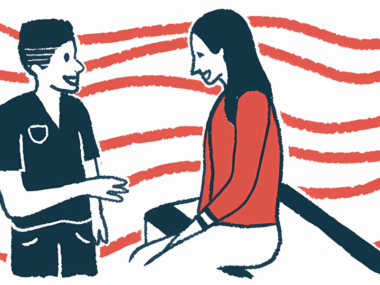Watching Out for the Effects of Caregiver Fatigue
Written by |

Feeling overwhelmed? Unsettled? Exhausted? I get it. I’m tired, too. I’m not tired of being a caregiver, but I am tired as a caregiver.
I have written about how fatigue affects people with Parkinson’s disease. Today, I’m writing about the other side of it: caregiver fatigue.
I would never want my sister, Bev, who has stage 3 Parkinson’s, to think that I am tired of caring for her. I love and treasure her. She became my guardian when our parents passed away before I was 18. But caregiver fatigue is real.
Keeping things in balance
Parkinson’s affects Bev’s short-term memory, decision-making abilities, and other cognitive functions, so I help her manage her bank account.
I’m a long-distance caregiver to my sister, providing most of my support over the phone. Although I’m in Arizona, I often feel the same degree of caregiver fatigue as Bev’s daughter, who lives with her in Ohio.
Bev and I talk on the phone every few days, and I update her on her account balance. Bev isn’t tech-savvy, so she doesn’t go online to check the account herself or pay bills. I pay her mortgage and some other bills out of her account online.
I also obtain her medical equipment (such as her rollator), schedule her hearing tests and doctors’ appointments, and manage her Medicare and other health insurance coverage.
I often have to repeat instructions, handle overdrafts in her bank account, make arrangements for conference calls with Medicare and doctors, and more — which sometimes means I don’t get to my own responsibilities. I often have trouble focusing and concentrating because I have a checklist of things that I need to do for Bev.
Emotional and physical effects
My feelings about doing all of this range from stress and anxiety to frustration and impatience. It turns out these feelings are not uncommon.
A 2003 study published in Psychology and Aging found significant differences in general well-being and rates of depression between caregivers and noncaregivers. Meanwhile, the Parkinson’s Foundation notes that 40-70% of caregivers are “significantly stressed,” and half of that group meets the diagnostic criteria for clinical depression.
To prevent caregiver fatigue, burnout, and depression, the foundation recommends “placing your own physical, medical, and emotional needs on equal par with the person with Parkinson’s.” That’s sometimes easier said than done, but as the saying goes, “You can’t pour from an empty vessel.”
Some practices that help me reduce caregiver fatigue include prayer, walking, socializing with friends, sharing my emotional challenges with close friends, and anticipating Bev’s needs to decrease her anxiety. I also try to do something that will increase my joy once a month.
Just doing life can be tiring some days. But providing almost daily care for someone with a chronic disease like Parkinson’s can be extremely fatiguing. Get some rest, refresh, and renew. We’ve got this!
Note: Parkinson’s News Today is strictly a news and information website about the disease. It does not provide medical advice, diagnosis or treatment. This content is not intended to be a substitute for professional medical advice, diagnosis, or treatment. Always seek the advice of your physician or another qualified health provider with any questions you may have regarding a medical condition. Never disregard professional medical advice or delay in seeking it because of something you have read on this website. The opinions expressed in this column are not those of Parkinson’s News Today or its parent company, Bionews, and are intended to spark discussion about issues pertaining to Parkinson’s disease.







Sandra O Martin
My feelings for all of this since I am the care giver for my husband, is there is never a break from any of this. Once we learned he has Parkinson, we learned the key thing is to maintain it, he’ll never get better. Meantime, I cook, I clean, I prep meals, and I’m constantly getting up and down for him while I'm home. I can't imagine how hard it must be for you doing this long-distance. You must have a daily caregiver checking in on your sister to help with the burdens of worrying for her through her everyday tasks. My husband is home when I leave for work and he's there when I come home. My only break from him is my full-time job with very little social life with co-workers. I do take our dog for a short walk every day. He has a brother who's retired and checks in with a phone call and takes him out occasionally on Fridays to visit their mother who lives in memory care. We have in-home physical therapy to help him with his daily exercises. It is a very tiring responsibility, and my night sleeps are not good anymore. I'm home with him every night and every weekend taking care of him. Don't get me wrong, I'm glad I'm able to care for him and I love him. I miss eating out and I feel I’m always cooking, prepping and doing laundry all the time. Eating meals together is sometimes a mess, bathroom issues are a pain and showering is getting to be more of a burden. I take him to the nail salon every 6 weeks since I can't bring myself to trim his toenails. He loves it since the soak his feet, massage his calves’ muscles. Cheaper than having the doctor do it! I'm getting to the point where I need to find someone to install grab bars in the bathroom, a bidet toilet would be nice. Get rid of the couch and get a couple lazy boy chairs for more floor space. I’m constantly thinking what he needs next in our home. My UHC work insurance does not cover home care. Figured out Good RX is cheaper than my medical coverage since we never meet our deductibles. He's mad, I'm frustrated and together, we tell each, this too shall past. We're glad we are still holding out for each other in this lonely, Covid-19/Omicron isolated world. I have neighbors say to me, we're here if you need us. I would like to take up on this but I'm not sure how since neither one of us want to be a burden to anyone. Yes, we can do this. We are doing it, one day at a time!
Elaine Walker
In addition to the points you raise regarding Carer Fatigue (which I agree with 100%) sleep deprivation is a major factor for people like myself who are in the Caring Role for 24 hours per day 7 days per week. My husband has advanced Parkinson's and rarely sleeps through the night which affects my quality of sleep. Being a Carer is both challenging and exhausting.
Linda Johnson
One additional problem with being a 24-hour caregiver is coordinating services. Not only does my husband have a primary physician, but he also has a neurologist, cardiologist, orthopedic doctor, urologist, optometrist, dentist, and physical therapist. Not only do I have to keep track of appointments, but I have to schedule them so the senior citizen bus can transport him in his wheelchair. I, too, suffer from sleep deprivation. I can no longer lift him, and on days he cannot support his own weight, I have to get help. I have found it helpful to have an Echo programmed with reminders to administer his medications at the proper times. I cannot imagine how difficult this would be if I did not love him!
James David Mortimer
For me, the greatest problem is the lack of informed advice. We have "Parkinson's Nurses" who have no prescriptive mandate and are unavailable at short notice, if at all, which is when carers such as I need advice, as when a sudden deterioration occurs, and you need to know where you are in the cycle of 5 stages; should the bed should be brought downstairs; is it time to get a wheelchair, and from whom; is there any respite care available?. The GP tries to help, but has many priorities greater than an older person with an incurable disease; the neurologist is a six-monthly chat. You are effectively on your own, which adds greatly to carer stress and, like Sandra says, there is never a break, but it has to be done, doesn't it